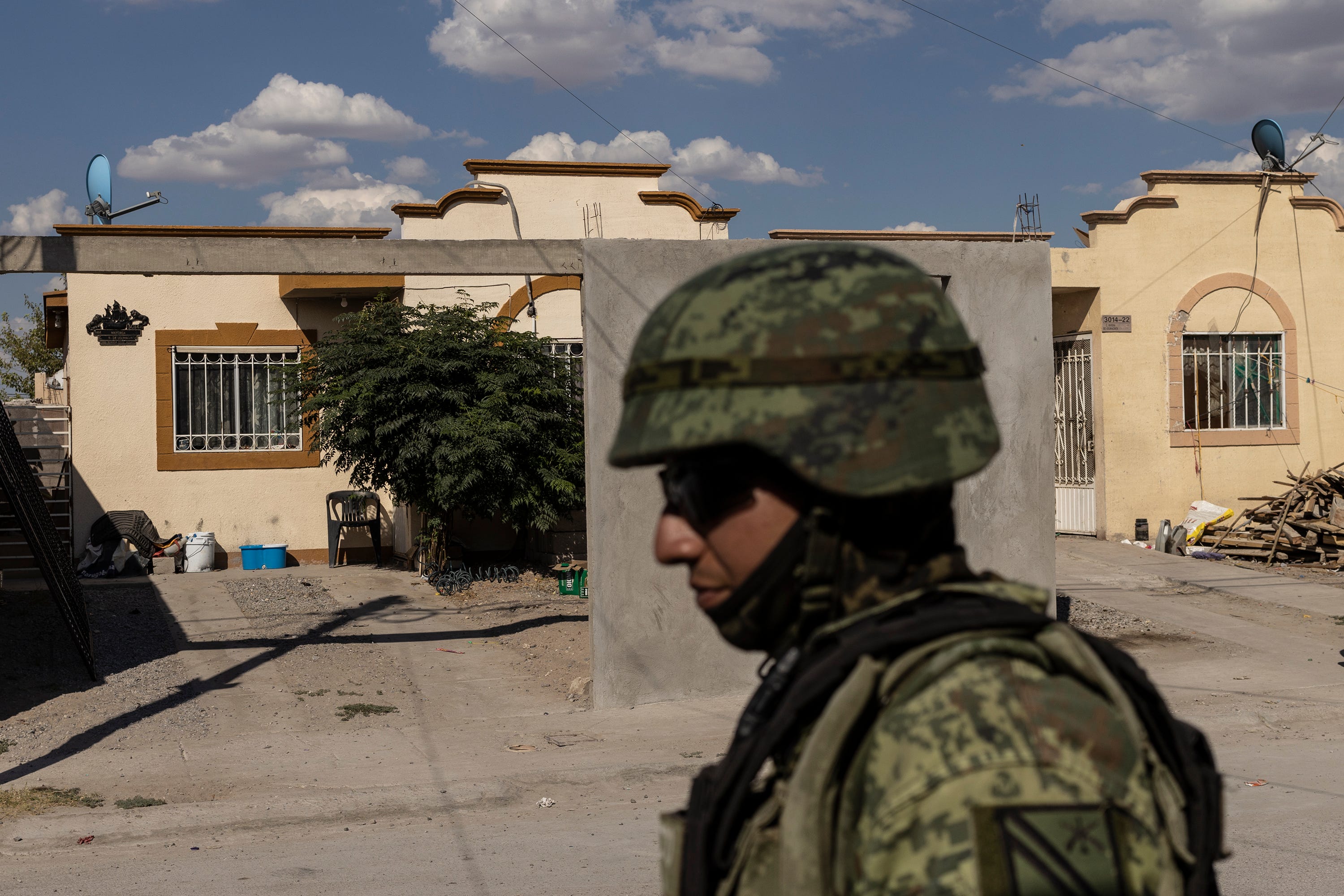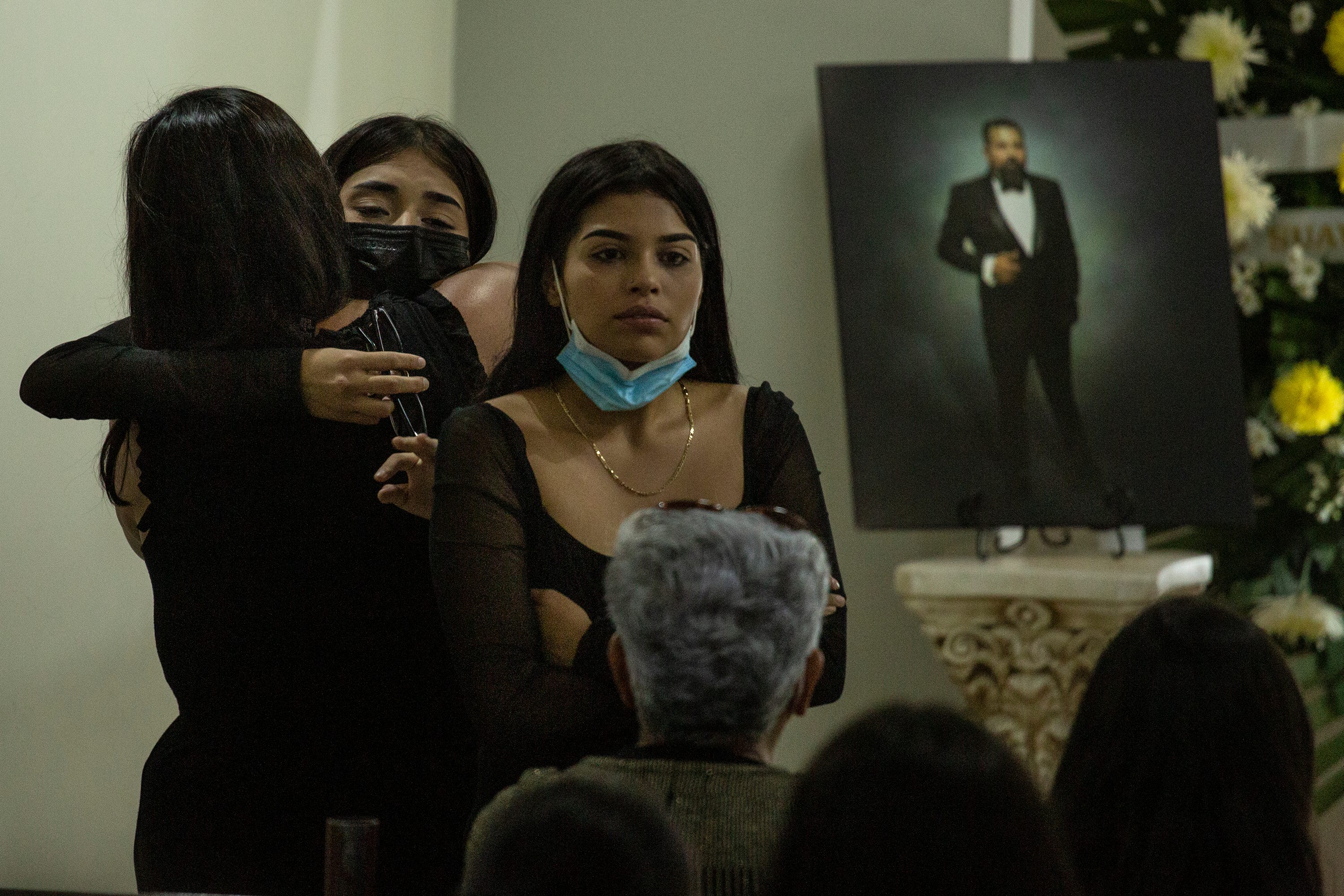CIUDAD JUÁREZ, Mexico ― The battery in Mario Romero’s phone was dying.
But he had enough charge to see the social media posts about trouble breaking out around the city that August day.
He and his colleagues from a local radio station were doing a live promotion at a Little Caesars pizza shop, but they decided to wrap things up early. While his co-workers waited for a few pizzas to go, Romero took the opportunity to solve his phone issue.
“My cell phone, it’s old. No one had a charger like mine, and my battery was dying, so I headed to Office Depot to buy a wire, and on the way, I started to hear the screams and the (bullet) impacts,” Romero told The Courier Journal during an interview in Ciudad Juárez, which sits across the border from El Paso, Texas.
When the shooting stopped, he ran back to the pizza shop, where he last saw his co-workers. The police were already there.
“I asked the officer, and he told me, ‘There are some injured.’ I prayed those were my friends, but then I saw their bodies lying on the floor.”
Romero is the radio station’s director. Four of his colleagues, including popular radio broadcaster Allán González, were among the dead.
“I’m a person of faith, so I believe what happened to me was a divine thing,” Romero said of the fact he was spared.
Overall, attacks across the city that day left at least 11 dead and 12 injured, according to state officials.
The attacks on random customers inside the pizza place and a convenience store marked a disturbing moment in the wave of drug cartel-fueled gang violence that has plagued parts of Mexico.
It derailed the frequently repeated and comforting belief that organized crime targets only those in the same business, and it raised the question of what is to come.
It also put the often-criticized crime-fighting policies ― dubbed “hugs not bullets” ― of Mexican President Andrés Manuel López Obrador front and center.
“Hopefully, it’s not something that will be repeated, because they attacked the civilian population ― innocent people,” López Obrador said during a news conference following the attacks.
I’m a person of faith, so I believe what happened to me was a divine thing.
A February report from the U.S. Commission on Combating Synthetic Opioid Trafficking said the Mexican government needs to do more to stop the flow of drugs into the U.S.
“All the good people we have cannot be effective without the full cooperation of the Mexican government, which we do not have,” U.S. Rep. David Trone, D-Md., told Politico following the report’s release. “Cartels control 30-plus percent of the GDP in Mexico, which means they are immensely powerful, and the [Mexican] government has adopted a policy of ‘hugs and not bullets’ and have decided to compromise and try to save lives in the country by not having an open civil war with the cartels …”
Since then, Mexican drug seizures have been increasing, and in July, working with the U.S. Drug Enforcement Agency, Mexican marines captured fugitive drug lord Rafael Caro Quintero.
Security analyst David Saucedo said the latest wave of violence may be related to this new push but added that damage had already been done by the administration to set the stage for the acts.
“I agree with the Americans. I believe you don’t negotiate with terrorists, and the president did,” he said.
In October 2019, the president made the decision to free Ovidio Guzman, the son of Joaquin “El Chapo” Guzman, after his arrest turned the streets of Culiacan into a war zone.
“And now the whole world knows what to do when (Sinaloa Cartel leader) Mayo Zambada is captured or when (Jalisco New Generation Cartel leader) Mencho is captured ― they will bring out their cells to attack the population for them to go free.
“I think the federal government gave a terrible message in this regard.”
Experts call ‘narco-terrorism,’ Mexico officials claim concerns overblown
The carnage in Ciudad Juárez began with a riot among rival cartel affiliates inside a local prison ― Cereso No. 3 ― that left two inmates dead, according to government officials.
Gang members on the outside then spread the violence around the city, setting fire to vehicles and businesses, in addition to the shooting attacks.
In all, similar violence was reported in four Mexican states around the time of the Juárez attacks.
Security analyst Fred Alvarez called it “a matter of narco-terrorism.” The term dates to 1980s South America and describes acts of terror fueled by or financed by the illegal drug trade.
“It’s a very unfortunate event, and I deeply regret the failure of the government intelligence because they have spent a lot of money on that. Where were the resources?” Alvarez questioned.
He repeated the conventional wisdom about old-school drug lords keeping their word about not messing with innocents, but added, “recent events in Juárez have demonstrated that these people have broken that pact because they are second-class or third-class criminals.
“They are not the big bosses of the past with whom the government could negotiate.”
Hitmen and drug dealers in Juárez are more violent because, according to analysts, they don’t have a word to keep and instead are using terror.
“These criminals have no word, and they know that the more fear you generate, the stronger they get,” Alvarez said.
Government officials were quick to downplay the question of “narco-terrorism.”
“They are not terrorist attacks; you don’t have to exaggerate the facts,” Interior Secretary Adán Augusto López admonished shortly after the incidents.
They are not the big bosses of the past with whom the government could negotiate.
Fellow security analyst Saucedo agreed with Alvarez, also labeling the violent events narco-terrorism and adding: “I think it is a new stage of drug trafficking in Mexico.”
And he thinks it’s a stage for which the country is unprepared.
“… The federal government does not accept that it’s facing a new reality, a new challenge,” Saucedo said. “There is a denial for an image issue. President (López Obrador), fearful that there will be a decrease in foreign investment in Mexico and a decrease in the flow of tourists to the country ― and also because of an impression issue in the face of the 2024 elections ― is reluctant to call these events narco-terrorism.”
The president said his opponents were “exaggerating” the acts of violence across different states of Mexico.
“… It’s propaganda. There is no major problem,” López Obrador said at a briefing in Mexico City.
Prisons in Mexico, Juárez function as ‘universities of crime’
The brother of a victim of the Little Caesars attack, who requested anonymity, said his sibling had just parked and was walking to the door when he saw a suspicious vehicle parked outside.
“Suddenly, six men left the car and started shooting at all the people. He didn’t know what to do, so he decided to run back to his car,” the man said. “My brother was shocked because the men saw him and said, ‘kill that one, too,’ (but) he managed to enter the car, which was destroyed by the bullets.
“We haven’t seen such a mess since 2008. We saw, indeed, confrontations between them, but like this, against ordinary citizens, not since a long time ago,” he said, adding, “my brother is still in shock.”
From 2008-12, Juárez residents endured the trauma of rival cartels vying for control of the area. More than 10,000 people were killed during that time.
Government authorities said the problem in the prison also started with a clash between the locally based Los Mexicles, an armed street gang, and Los Chapos, associated with the Sinaloa Cartel.
In addition to the two prisoners shot to death, about 20 were wounded.
The federal government does not accept that it’s facing a new reality, a new challenge. There is a denial for an image issue. President (López Obrador), fearful that there will be a decrease in foreign investment in Mexico and a decrease in the flow of tourists to the country ― and also because of an impression issue in the face of the 2024 elections ― is reluctant to call these events narco-terrorism.”
“The events in Ciudad Juárez have to do with the current situation in the prisons of Mexico. They are universities of crime. The order was given by someone in prison, and he did it through social media or any other communication allowed in that place, just as weapons are also allowed,” analyst Alvarez said.
Los Mexicles members on the outside then took the violence to the streets of the city, authorities said.
In addition to the Little Caesars shootings, two women were killed in a convenience store ― one an employee and another who was seeking a job.
Local media has reported Los Mexicles was born as a gang of members deported from the United States, and that the cell sometimes communicates in the Nahuatl Aztec language to go unnoticed.
On Aug. 12, six members of Los Mexicles were arrested in the Ampliación Aeropuerto neighborhood, Deputy Security Minister Ricardo Mejía said.

Joint operation of the armed forces with the local police of Ciudad Juárez after a report of shots fired in the Portal del Valle neighborhood. Aug. 14, 2022 Cristopher Rogel Blanquet/Special to Courier Journal
The National Guard was brought in to quell the violence. At least two buildings were damaged, and 28 shops and 19 vehicles were burned, officials said.
“I couldn’t find a place to hide,” said a man who lives next to the house where the six members were arrested after a clash with the police.
“A truck was parked outside that house for an hour or so, then they left, and 10 minutes later, the cops arrived shooting at the house,” he told The Courier Journal.
“I’ve never noticed anything weird with those guys. They arrived at that house 10 days ago. We never talked,” the man said, who asked to remain anonymous for fear of retaliation.
Two funerals: Allán González, Los Chapos member killed in prison riot
The funeral for radio broadcaster Allán González was solemn, as the shock of the unexpected death weighed heavily on those in attendance.
The room was full of flowers and funeral wreaths from other media organizations.
The media was initially not allowed to enter the funeral parlor, but with this outpouring of support, his son decided to grant access and get to know some of his father’s colleagues who were expressing solidarity.
Allán loved rock music and the radio, a friend of his said. He mentioned his penchant for reporting and that he loved letting his listeners know about things like traffic tie-ups in the city.

Relatives and friends mourn radio broadcaster Allán González during his funeral in Ciudad Juárez. González was among four radio state employees killed at a pizza shop in the city on Aug. 11, 2022. Cristopher Rogel Blanquet/Special to Courier Journal
Meanwhile, in the next room, another funeral was taking place ― a member of Los Chapos, one of the inmates killed in the prison where the many tragedies began.
Cristopher Rogel Blanquet contributed reporting for this story.
Karol Suárez is a Venezuela-born journalist based out of Mexico City. She is a contributing writer to The Courier Journal. Follow her on Twitter at @KarolSuarez_.

